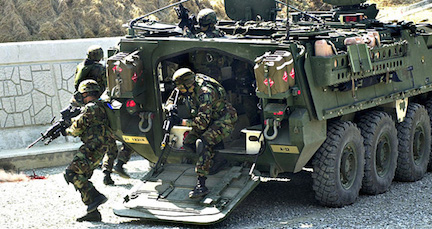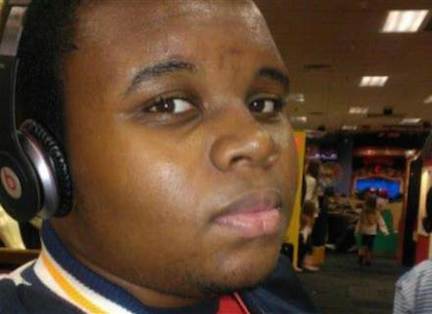“Violence is man recreating himself.” —Frantz Fanon
IN THE WAKE of the grand jury failing to return a verdict to try Darren Wilson for murdering Micheal Brown, many people are saying that they don’t understand why people in Ferguson would riot, or as it’s popularly being put, “destroying their own communities.” If you don’t understand why, then you are shockingly disengaged from the amount of pain and suffering that plays out as a matter of normalcy in this country. Our communities are already destroyed, they have been systematically impoverished by capitalism, an unequal distribution of wealth, jobs, services, investment, and opportunity that is so grossly unjust it has to be defended by a predatory race-and-class based system of courts and prisons whose illegitimate stranglehold on power requires it to be enforced by a violent, militarized police force.
So when I hear that rioting, burning, looting, and fighting police are not the correct response, that there are “more constructive ways to show your anger”
. . .no, there are not. You are entirely missing the point of violent demonstrations as a reaction to injustice. They are not meant to be constructive, they are meant to be destructive. They are meant to resist the violence perpetrated on us by an authoritarian state. They are meant to strike back against mounting oppressive conditions that are systematically kept in place by a racist power structure.
The law functioned exactly as it was meant to in the Ferguson grand jury decision. Grand juries succeed in returning a verdict 99.996% of the time, but they failed to do so in Ferguson. The real exception is not the fallacy of the prosecutor McCulloch’s inane argumentation justifying the murder of an unarmed boy, or the argument that justice was even remotely represented by the charade. It is that the slim margin where an indictment fails to be delivered is so often saved for instances exactly like this one–where the outcome of the decision directly effects the power structure. D.A.s protect cops, cops protect their own, and no case that puts the system on trial with an entire nation watching ever sees the light of day.
We have had a systematic failure of the justice system for a while now in this country and we don’t know what to do. When justice is no longer attainable through appeals to due process, when every function of abiding the law fails, then justice ends up being sought outside of the rule of law. It is not right or wrong, it is the natural result of the breakdown of the rule of law. The onus in the law, since they are the ones who insist on their own totality—you either follow their law, or else. There is no other option. So when that ultimatum breaks down, not only do we see the violence it was already embodying, we see the responsibility fall on the ones who fail to uphold their own laws.
Most people would hit back if they were physically attacked. Yet political conditioning has been so debased and desensitized in America that many do not possess the intellectual freedom to even consider how violence could be an appropriate response to violence, albeit one that harnesses the very destructive capacities of nature itself, one of the cardinal forces that oversees life on earth.
The entitled class that takes to Twitter and FB to express anger about the grand jury decision but mourn the “deplorable” violence that arose as a natural reaction to such an offensive and oppressive decision, do so on the presumption that they are in a position to tell other people what they can and can’t do, which forms of expression are acceptable and which are not, and, more importantly, which physical actions are condoned and which are deemed not permissible for offending the passivity of moderate sensibilities.
When you do that, your opinions align themselves with the forces that restrict people’s free actions, that take as their right the ability to control or restrict what other people say, think, and do. When you do that, you align yourself with the police. You align yourself with an over-reaching security state that is very concerned with casting its net so wide that there is no possible way to act outside of it. So congratulations, your commentary, that you believe embodies your empathy, moral superiority, and appeals to reason, has achieved nothing more than reenforcing the state that created this violence in the first place.
Part of the scourge of modern thought—mostly liberal, but embodied in hysterical conservatism in a more vulgar form, too—is suffering from the belief that we live in a world that exists for our pleasure and approval. I keep reading how we need to “have a more honest dialogue about race and justice in this country,” something we desperately need, of course. But where exactly do people expect this dialogue to carry out? In a mainstream media that has served as a mouthpiece for corporations, corrupt politicians, and the Department of Defense? Or on social media, which is almost more nefarious, because we are actually complicit in helping the very forces that control us? We give so much private information to the NSA that we are helping the security state pattern our behavior, predict what we are going to do, how we are going to react, and extend the scope of power to encompass any move toward sovereignty or even undermining the ability to have an original thought or perform an original action.
Originality of action is what is really feared here—that maybe, just maybe, we will do something unpredictable, anything on the spectrum, from violence when we are angry or under attack, to love when we are grateful and affectionate. Maybe we will come together, or maybe walk away from it all. Either way, security states and vampire capitalism have no other purpose than to figure us out in order to control us. Otherwise, they have no reason for existing, and no power. If we move on without them, the grotesque dispersal of state power on display in Ferguson will only be the beginning.
The state has a monopoly on violence. All too often, we serve as unwitting victims on the receiving end, praying for some sensible form of mitigation that doesn’t exist to come along and save us. Disorganized, peaceful protest does not work. It has been co-opted, hemmed in, easily dealt with, ignored, and absorbed by the state. That is exactly why they encourage us to do it, because it is harmless and without meaning. They only pay attention when it costs them money, and security, when business as usual ceases. That is what “No Justice, No Peace” means. It literally means that until justice is served there will be a disruption of the corrupt, unjust, and violent order of things, where the murder of unarmed civilians is condoned by the law and goes unpunished. The police in this country do not go a day without aggressive overreaction and the display of sociopathic behavior. They do not go a week without murdering a citizen under questionable or indefensible circumstances. Why would they? They have been granted the power to act this way, and the people have no meaningful recourse but to defend themselves by any means necessary.
This dialogue we hope we have is not going to play out in the media, on social networks, in Congress, at the ballot box, in courts, appeals, or within the rule of law. We have to change, evolve, and become incomprehensible to the state whose sole purpose for existing is to adapt faster than we do in order to control us. This new dialogue is tasked with inventing an entirely new social order, a new economic model, with new interpersonal ways of identifying, communicating, and respecting one another. This development has to take place outside of the current government entirely, outside of the realm of global capitalism, outside of partisan allegiances and old ineffective modes of identity. Only then can we talk about getting rid of a rotten system. Not by fixing the one that is broken, but by developing new ideas, new networks, structures, and spaces that over time make the old way of doing business obsolete. We have to. It has never been more obvious that our lives depend on it.




